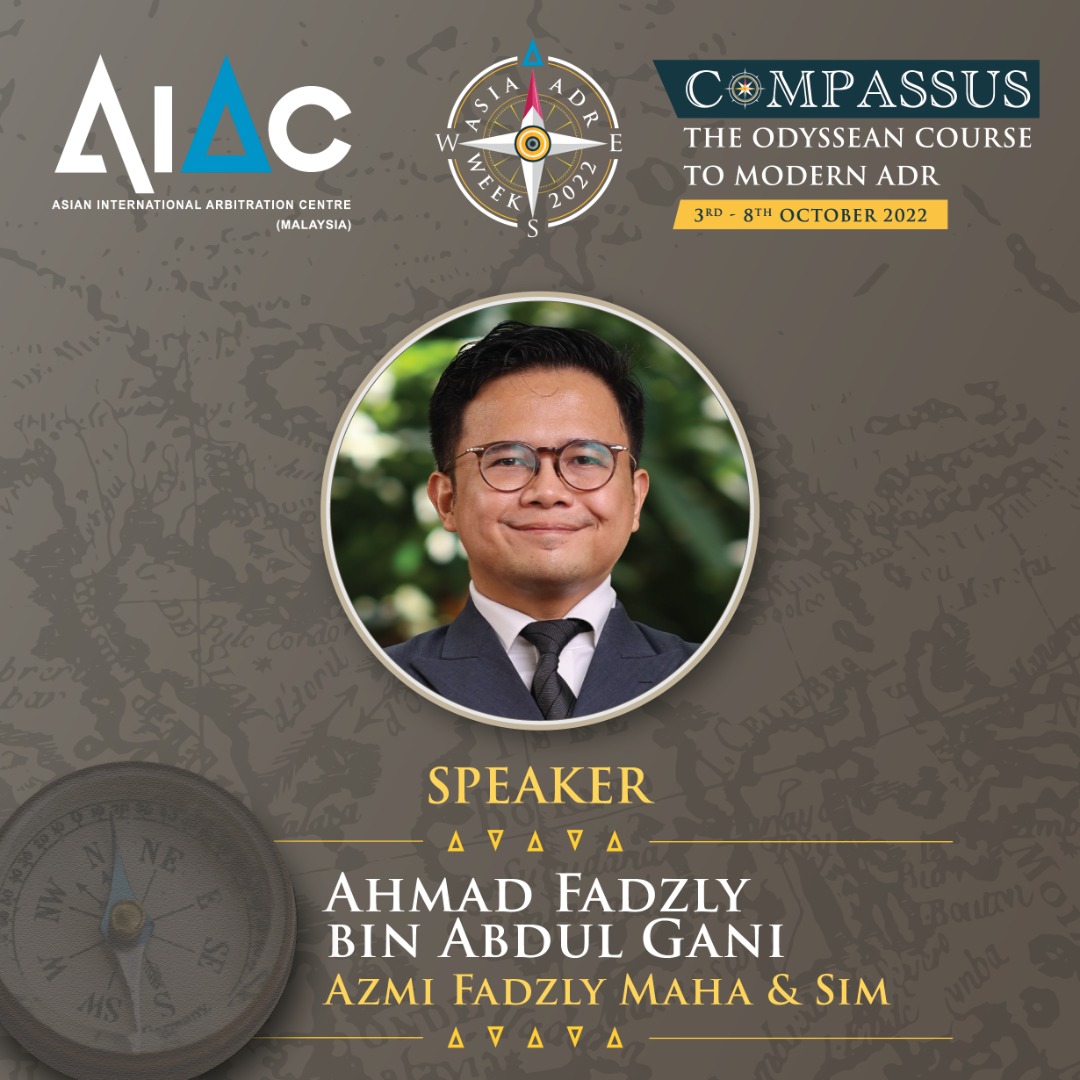AIAC ADR week 2022 program

THE ODYSSEAN COURSE – TO MODERN ADR
Event type: Hybrid Event
3rd – 8th October 2022
Homer’s Odyssey, is one of the most significant literary works since antiquity – chronicling the adventures of Odysseus, who embarked on a decade long journey to reunite with his kingdom and family – touching the hearts of many and foretelling a course marked with determination, perseverance and relentless ambition as relevant in today’s world. Similar to his journey, the ADR landscape has faced several uncertainties
and challenges particularly in the last two years.
Since its inception, the AIAC has served to act as “compassus” – a symbol of finding the right path in navigating through the uncharted terrains of ADR. This year’s Asia ADR Week 2022 promises to showcase the strides made in this Odyssean journey and how in facing new challenges, the AIAC will serve as a compass in guiding practitioners, stakeholders and businesses in finding their way through conflict resolution in the most comprehensive and efficient manner. In keeping to the theme, “Compassus: The Odyssean Course to Modern ADR”, participants can expect to be steered in the right direction with discussions on best practices, innovative approaches to ADR, and legal developments – all with the guidance of “compassus”. And as with the needle pointing North, the AIAC is unwavered in its commitment to the industry in fielding itself unto unfamiliar terrain and in mapping a new course, fit for the modern ADR world.
GENERAL ADMISSION
Full Conference
MYR 1,700 / USD 385
Day 1 & 2
MYR 1,200 / USD 275
CIPAA Conference
MYR 600 / USD 140
Virtual Pass (Brella)
MYR 200 / USD 50
INQUIRY
For further information and sponsorship opportunities, Hybrid Event please contact enquiry@aiac.world / +603 2271 1000
OUR SPEAKERS


PROGRAMME
DAY 1 (THURSDAY, 6TH OCTOBER 2022)
08:00 – 09:00 | Registration |
09:00 – 09:15 | ASIA ADR WEEK 2022 Opening Remarks |
09:15 – 09:30 | ASIA ADR WEEK 2022 Special Address |
09:30 – 10:45 | ASIA ADR WEEK 2022 Keynote Address |
10:45 – 11:00 | Launch of ASIA ADR WEEK 2022: “Compassus – The Odyssean Course to Modern ADR” |
11:00 – 11:30 | Networking Break |
11:30 – 13:00 | Session 1 – Here Comes Sparta: The Impact of Armed Conflicts on International Arbitrations
|
13:00 – 14:00 | Lunch |
14:00 – 15:00 | Session 2 – The Wrath of the Token: The Arbitrability of Blockchain Related Disputes and the Role of Arbitral Institutions |
15:00 – 16:30 | Session 3, Breakout 1 – The Battle of .com: Primer on Domain Name Disputes |
16:30 – 17:00 | Networking Break |
17:00 – 18:30 | Session 4 – Sailing Southeast: Malaysia as the Agora of International Arbitration |
18:30 onwards | Networking Event |
DAY 2 (FRIDAY, 7TH OCTOBER 2022)
08:30 – 09:30 | Registration |
09:30 – 11:00 | Session 1 – Rechartering a Modern Legislative Framework |
11:00 - 11:30 | Networking Break |
11:30 - 13:00 | Session 2 – The Guided Way: Future Fee Arrangements in Arbitration |
13:00 – 14:30 | Lunch |
14:30 – 16:00 | Session 3, Breakout 1 – Tackling Parallel Proceedings: A Never Ending Journey |
16:00 – 16:30 | Networking Break |
16:30 – 18:00 | Session 4 – Arbitration in Human Rights, ESG and Employment Disputes: Bridge to Terabithia? |
18:00 onwards | AIAC ADR Week 2022 Evening Reception |
DAY 3 (SATURDAY, 8TH OCTOBER 2022)
08:30 – 09:30 | Registration |
09:30 – 09:45 | CIPAA 2012 Opening Remarks |
09:45 – 10:30 | CIPAA 2012 Keynote Address |
10:30 – 11:00 | Showcase of the CIPAA 2012 Statistics |
11:00 – 11:30 | Networking Break |
11:30 – 13:00 | Session 1 – Rapid Fire Debate Debate 1: Bounding without Boundaries The CIPAA 2012 came into force in 2014 to provide a temporary resolution for payment disputes arising out of construction contracts. Though arguably having fulfilled its goal in the early years, payment disputes have now become more complex with claims increasingly accompanied by voluminous documents following the evolution of adjudication practice and procedure, leaving the black letter of the law trailing behind and practitioners discovering more and more lacunae in the CIPAA 2012 framework. This brings about the question as to whether CIPAA 2012 still has potential to serve its purpose at a day and age where final claims are now permitted, and with parties increasingly adopting creative approaches to adjudication processes – ultimately, veering away from the Legislature’s intention of CIPAA 2012? House A: This House believes that the CIPAA 2012 framework remains a viable alternative dispute resolution method and should continue to be the first and primary avenue for construction disputes as a statutory mechanism. House B: This House believes that the present CIPAA 2012 has veered away from its intended purpose and no longer sustains contemporary dispute resolution given the likes of expedited arbitration processes that provide a final and binding resolution at an equally quick-paced duration. Debate 2: Who’s Who – The Race for First Dibs The right to refer a dispute to adjudication has typically been that of the unpaid party’s given that the aim of the CIPAA 2012 is to facilitate and progress payment disputes and avoid short-term cash-flow problems during project delivery and resultant delays. However, with the draftsmen of CIPAA 2012 permitting either party, under section 7, to refer a dispute arising from a payment claim to adjudication, what the industry has witnessed increasingly taking place is the “race to file the Notice of Adjudication” – reflecting the statute’s recognition of a non-paying party’s ability to step into the shoes of the Claimant, whilst the unpaid party (although being the party that served the Payment Claim) steps into the shoes of the Respondent. This practice has seemingly depicted the perceived importance and significance associated to one occupying the status of Claimant – specifically, over that of the Respondent. This may hold true given that the right to withdraw adjudication proceedings per section 17(1) and the right to a final say in the form of the Adjudication Reply, lies with the Claimant. Whilst the characterisation of the parties may not affect the outcome of the proceedings since the amount in dispute is limited to what has been claimed by the unpaid party in the Payment Claim, the question still remains as to whether this race to be identified as the Claimant signifies a much larger problematic play at hand, that is, dominance in adjudication proceedings and the effect (strategic or otherwise) it could potentially have to the legitimate practice and procedure of adjudication. House A: This House believes that the race to become the Claimant is an effective play in strategy, by feeding further into a perceived bias of Claimants being treated more favourably in adjudication proceedings. House B: This House believes that the race to become the Claimant has no effect on the practice and procedure of adjudication and is, on the contrary, a useful means of ensuring that disputes are promptly referred to adjudication. Under the CIPAA 2012 framework today, adjudication proceedings are estimated to be completed within five months from the issuance of the payment claim up until the delivery of the adjudication decision. This is pertinent as it provides a whirlwind remedy for subcontractors who are financially constrained and minimizes prolonged suspensions in construction works. However, in practice, parties as well as the adjudicator often seek for extensions of time for various reasons citing the necessity to strengthen their claims and determination respectively. These include requests by parties for the filing of submissions and responses further to and in addition to the Adjudication Reply. This consideration is complicated further when the non-paying party/Respondent advances defences and/or set offs in the Adjudication Response not previously raised in the Payment Response – causing a ripple effect as the unpaid party/Claimant is given insufficient time to respond and the adjudicator is now required to review more documents within the same timeframe of forty-five days, potentially jeopardising the quality of the decision. This brings about the question as to whether the current timelines and the scope of document submissions in CIPAA 2012 are adequate to provide a just resolution without compromising the quality of the proceedings. House A: This House believes that the current timeline is sufficient given the goal of quick and speedy justice, and therefore should be strictly adhered to. House B: This House believes that the essence of CIPAA 2012 will be not defeated despite the widening of timelines in the interest of upholding quality and pursuit of natural justice in adjudication proceedings. |
13:00 – 14:00 | Lunch |
14:00 – 16:00 | Session 2 – Guide to the Classics: Revisiting the Need for Amendments to the Construction Industry Payment and Adjudication Act 2012 |
16:00 – 16:30 | Networking Break |
16:30 – 18:00 | Session 3 – Thumb Compass: The Effect, Survival and Prospect of the 2022 Inflation on Construction and Adjudication |
18:00 onwards | Networking Event |
